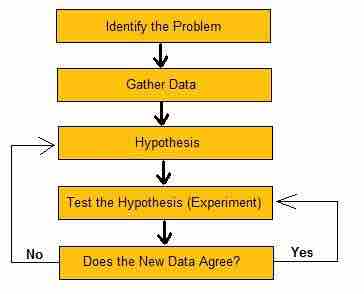Economics, as a science, follows the scientific method in order to study data, observe patterns, and predict results of stimuli.
There are specific steps that must be followed when using the scientific method . Economics follows these steps in order to study data and build principles:

Scientific Method
The scientific method is used in economics to study data, observe patterns, and predict results.
- Identify the problem - in the case of economics, this first step of the scientific method involves determining the focus or intent of the work. What is the economist studying? What is he trying to prove or show through his work?
- Gather data - economics involves extensive amounts of data. For this reason, it is important that economists can break down and study complex information. The second step of the scientific method involves selecting the data that will be used in the study.
- Hypothesis - the third step of the scientific method involves creating a model that will be used to make sense of all of the data. A hypothesis is simply a prediction. What does the economist think the overall outcome of the study will be?
- Test hypothesis - the fourth step of the scientific method involves testing the hypothesis to determine if it is true. This is a critical stage within the scientific method. The observations must be tested to make sure they are unbiased and reproducible. In economics, extensive testing and observation is required because the outcome must be obtained more than once in order for it to be valid. It is not unusual for testing to take some time and for economists to make adjustments throughout the testing process.
- Analyze the results - the final step of the scientific method is to analyze the results. First, an economist will ask himself if the data agrees with the hypothesis. If the answer is "yes," then the hypothesis was accurate. If the answer is "no," then the economist must go back to the original hypothesis and adjust the study accordingly. A negative result does not mean that the study is over. It simply means that more work and analysis is required.
Observation of data is critical for economists because they take the results and interpret them in a meaningful way. Cause and effect relationships are used to establish economic theories and principles. Over time, if a theory or principle becomes accepted as universally true, it becomes a law. In general, a law is always considered to be true. The scientific method provides the framework necessary for the progression of economic study. All economic theories, principles, and laws are generalizations or abstractions. Through the use of the scientific method, economists are able to break down complex economic scenarios in order to gain a deeper understanding of critical data.